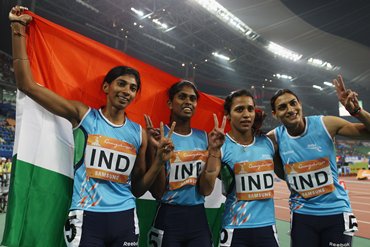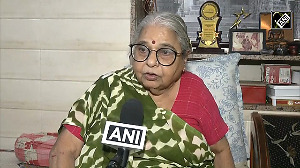Indian athletics' biggest doping scandal involving six top women runners, including three Asian and Commonwealth Games gold medallists, ended with the Switzerland-based Court of Arbitration for Sports handing them an enhanced ban of two years.
The world's highest sports tribunal upheld the International Athletics Federation's (IAAF) appeal to increase the ban period of the six Indian athletes from one to two years.
"The IAAF's appeal has been upheld by the CAS and the six Indian athletes have lost their case. Their two-year ban period will start from the day of provisional suspension slapped on them by the NADA," a top Athletics Federation of India official said.
The decision of the CAS, announced on Tuesday night in Lausanne, is final.
 Three of the six athletes were present at the hearing held on Monday while the other three pleaded their case via teleconference.
Three of the six athletes were present at the hearing held on Monday while the other three pleaded their case via teleconference.
Ashwini Akkunji, Mandeep Kaur and Sini Jose were part of the Indian 4x400m relay quartet that won gold in 2010 Commonwealth Games in New Delhi and Asian Games in Guangzhou a month later.
The other three dope-flunked athletes are Juana Murmu, Priyanka Panwar and Tiana Mary Thomas -- all 400m runners.
Ashwini, 24, also won a gold in 400m hurdles in the 2010 Asian Games while Mandeep, also 24, was a member of the Indian 4x400m relay-winning team in the 2006 Doha Asian Games.
With the CAS ruling that the ban begins from the day of provisional suspension, Ashwini and Priyanka will serve the ban till July 3 2013, as they were provisionally suspended on July 4 last year.
Mandeep and Juana are banned till June 23 next year while Sini and Mary Thomas will serve ban till June 30 next year.
The IAAF had filed an appeal last month before the CAS challenging the one-year ban imposed on the athletes by a NADA panel last year, stating that they should not be treated leniently but be handed the maximum ban of two years.
The maximum ban for first-time violators stands at two years but a NADA panel, headed by retired district judge Dinesh Dayal, had handed a reduced penalty of one-year ban on grounds that the athletes were not found guilty of intentionally taking the banned substances.
"We did not find any significant fault on the part of these athletes on how the banned substance entered their bodies and they will get reduced penalty under clause 10.5.2 NADA rule," Dayal had said at that time.
Dayal had ruled that the date of suspension will start immediately but any period under provisional suspension would be credited.
The World Anti-Doping Agency (WADA) appealed against the NADA Disciplinary Panel's decision, asking to increase the ban from one to two years.
The NADA Appeals' Panel not only upheld the disciplinary panel's decision to ban for just one year but also ruled that the ban period will start from the day of collection of samples. That was done to give the athletes a chance to qualify for the London Olympics.









